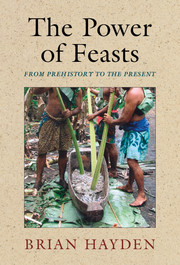Book contents
- Frontmatter
- Contents
- List of Figures
- Acknowledgments
- 1 Before the Feast
- 2 Food Sharing and the Primate Origins of Feasting
- 3 Simple Hunter/Gatherers
- 4 Transegalitarian Hunter/Gatherers
- 5 Domesticating Plants and Animals for Feasts
- 6 The Horticultural Explosion
- 7 Chiefs Up the Ante
- 8 Feasting in Early States and Empires
- 9 Industrial Feasting
- References Cited
- Index
4 - Transegalitarian Hunter/Gatherers
Published online by Cambridge University Press: 05 October 2014
- Frontmatter
- Contents
- List of Figures
- Acknowledgments
- 1 Before the Feast
- 2 Food Sharing and the Primate Origins of Feasting
- 3 Simple Hunter/Gatherers
- 4 Transegalitarian Hunter/Gatherers
- 5 Domesticating Plants and Animals for Feasts
- 6 The Horticultural Explosion
- 7 Chiefs Up the Ante
- 8 Feasting in Early States and Empires
- 9 Industrial Feasting
- References Cited
- Index
Summary
Our chief brings jealousy to the faces . . . by . . .
Giving again and again oil feasts to all the tribes . . .
I am the great chief who makes people ashamed . . .
I am the only great tree, I am the chief!
You are my subordinates, tribes . . .
I am he who gives these sea otters to the chiefs, the guests, the chiefs of the tribes.
I am he who gives canoes to the chiefs, the guests, the chiefs of the tribes.
– From Benedict 1934:175–8With the appearance of complex (transegalitarian) hunter/gatherers, we enter into an entirely different cultural realm – one that is not egalitarian and does not shy away from competition based on economic production to underwrite bids for greater influence and greater benefits. Feasts become the arenas for economically based competition and many other gambits for power, prestige, spouses, and capital. Feasts become the venues for social and political negotiations; feasts are the seat of village governments (Beynon 2000:31; Clarke 2001:163; 1998). At times, the importance of feasts, the array of different kinds of feasts, and the exalted importance of feasts become bewildering. There are lavish feasts for coming of age, for marriages, funerals, building houses, solstices, succession to political roles, and many other events. Nothing could be further from the behavior of the simple foragers that we saw in the preceding chapter. To understand the nature of and the reasons for this change, I discuss in further detail some of the characteristics of these societies and some of the ideas about why such changes took place. We then explore the principles on which transegalitarian feasting was based and some of the resulting characteristics, followed by a sampling of ethnographic and archaeological examples (see Figure 4.1).
- Type
- Chapter
- Information
- The Power of FeastsFrom Prehistory to the Present, pp. 47 - 108Publisher: Cambridge University PressPrint publication year: 2014
- 1
- Cited by



